Latino Iowans are playing a bigger role in the caucuses — and Democrats are paying attention

DES MOINES — Last month in Des Moines, Stephanie Medina got into her Nissan hatchback and drove west.
The organizer for Democratic presidential candidate Elizabeth Warren was soon sharing tamales with Iowans at a predominantly Spanish-speaking event in Perry. Hours later, she was in Denison, home to another large Latino community, to eat chips and salsa at a restaurant with several Latino families, including a couple who moved to the area from Mexico more than half a century ago.
"I'm willing to drive anywhere," said the Des Moines-based Medina. She joined Warren's Iowa campaign over the summer as a Latinx constituency coordinator. "… I find myself saying, 'It's only two hours; it's only two hours away, one way.'"
In the massive Democratic presidential field, having a staffer with a title like Medina's is no longer singular. Compared to previous cycles, the 2020 campaigns have expanded their efforts to court Latinos, a small but growing voting bloc in the predominantly white first-in-the-nation caucus state.
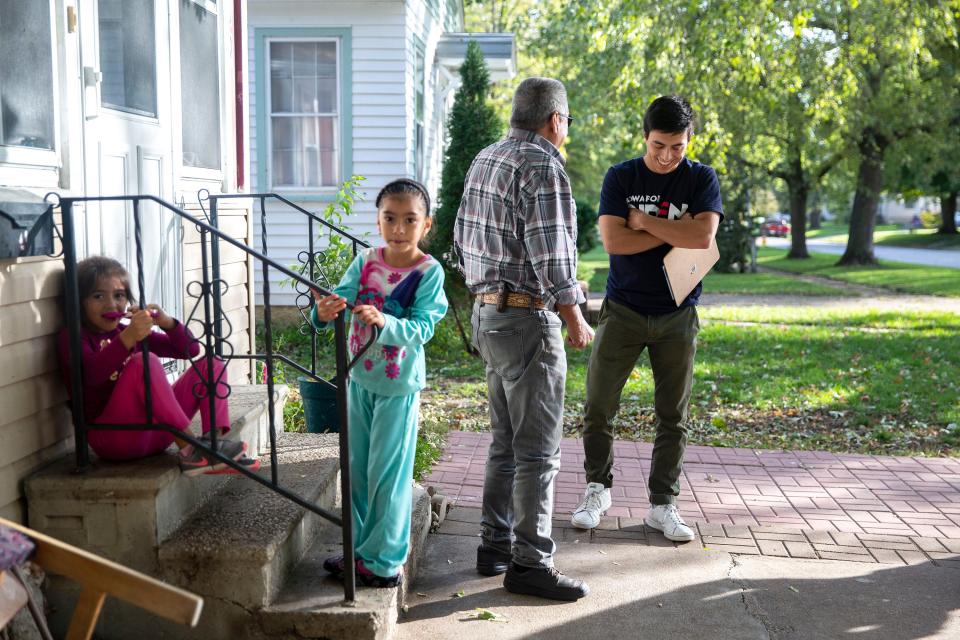
Latinos now make up about 6.2% of Iowa’s population, a figure that's projected to roughly double by 2050, according to a State Data Center of Iowa report. That gives them a powerful voice in politics. Latinos are responding by not only turning out at the ballot box, but jumping into local and state elections as candidates.
At an October presidential town hall in Des Moines hosted by the League of United Latin American Citizens, known as LULAC, Sindy Benavides, the organization's CEO, indirectly referred to President Donald Trump's immigration policies and language on immigrants. She predicted it would compel Latinos to show up in 2020.
"When we’re called things and told that we’re the 'other,' let us remember our rich history as Latinos in America," Benavides said.
"For we, too, are American," she added, before translating in Spanish: "Somos Americanos."
Outside the convention venue, staff for former Texas Congressman Beto O'Rourke and U.S. Rep. Tulsi Gabbard of Hawaii were among the campaigns handing out reading material in Spanish and promoting upcoming events geared toward Latinos. (O'Rourke has since dropped out of the race.)
Campaigns work to reach Latino caucusgoers where they are
As he does his work, Camilo Haller uses himself as a profile of someone involved in politics. A field organizer for former Vice President Joe Biden's Iowa campaign, he’s a bilingual Colombian immigrant who came to the United States when he was 7 and passed his citizenship exam this year.
Haller, who was raised in Oklahoma, is based in Storm Lake, in northwest Iowa. A big part of his job is connecting with the Latino community.
"There are a lot of immigrants in Storm Lake, and I’m an immigrant myself, so I think, I just like to show my example as a way to normalize like, you know, it’s not just out-of-touch people who don’t get the immigrant experience that are out here that are involved. There are a lot more people like me," he said.
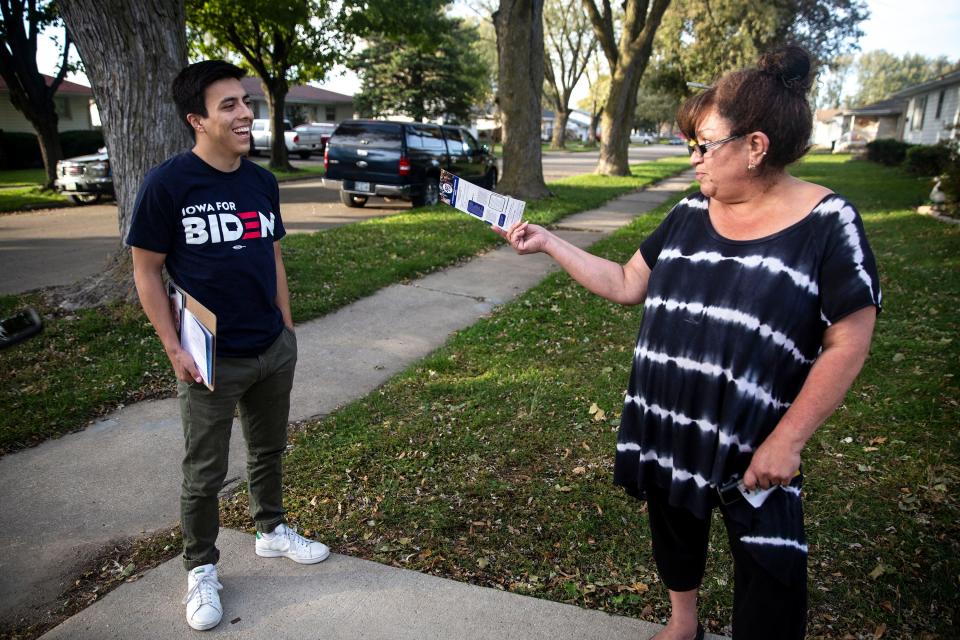
In October, Biden's campaign launched "Todos Con Biden," or, Everyone with Biden — a national effort to connect to Latino supporters through phone banking, community events, days of action and fundraising. Biden campaign officials have also emphasized the diversity of their staff. Haller is one of several bilingual field organizers in Iowa, and Biden's deputy Iowa state director, Claudia Chavez, is bilingual and Latina.
Biden's campaign is one of many stressing the need for Latino Iowans to get involved.
U.S. Sen. Kamala Harris of California has had several prominent campaign surrogates from the Latino community hold events in Iowa on her behalf. Recently, Dolores Huerta, a national civil rights and labor leader, held a “Para La Gente,” or, For the People, house party in Des Moines.
The campaign plans to hold caucus training sessions in Latino communities. In August, Harris also won the endorsement from the very active Asian & Latino Coalition, which has hosted many of the presidential candidates this year.
Prakash Kopparapu, the Asian and Latino Coalition chair, said the endorsement means the coalition offers support to Harris' campaign when she comes to Iowa, whether through members becoming precinct leaders or by discussing policy items with the campaign's leadership team.
"We asked our members after the process: What prompted you to vote for Sen. Harris?" Kopparapu said. "They like her policy on health care ... she knows immigration issues, not only undocumented and otherwise, but the legal immigration process. That clearly resonated a lot."
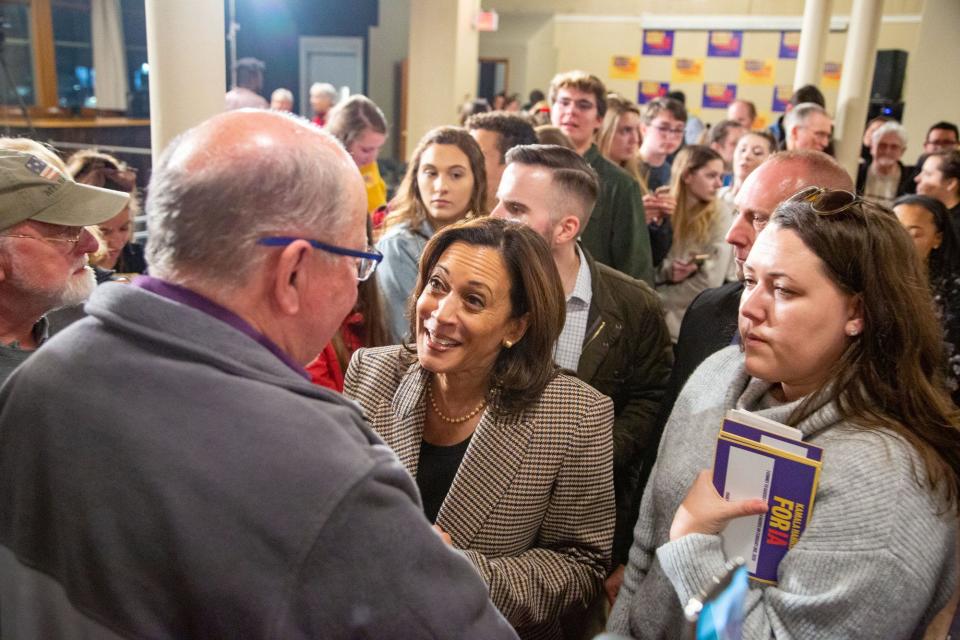
Warren, the U.S. senator from Massachusetts, has several organizers who speak Spanish. Medina, Warren's top organizer in the state on Latino issues, committed to attending several Latino festivals this year so she could hear directly from members of the community.
Pete Buttigieg, the mayor of South Bend, Indiana, has opened field offices in Storm Lake and Marshalltown, two areas with large Latino communities.
U.S. Sen. Bernie Sanders of Vermont got a strong reception at the LULAC presidential town hall. Ahead of the Nov. 5 municipal elections, Sanders endorsed Chelsea Chism-Vargas, a Peruvian-American running for Des Moines City Council, and had his volunteers knock doors for her. Julián Castro also endorsed Chism-Vargas.
Misty Rebik, Sanders' Iowa state director, said in a memo that "our turnout operation is paying special attention to Latinx voters in Iowa."
The Sanders campaign recently texted Iowa Latinos a Spanish language digital ad that highlighted Sanders' father's story of immigrating to the United States. The goal, according to the memo from Rebik, is "fundamentally transforming the Iowa electorate."
Sanders' near draw with Hillary Clinton in 2016 shows the value of the Latino vote in the caucuses, said Joe Henry, political director of LULAC's Iowa chapter.
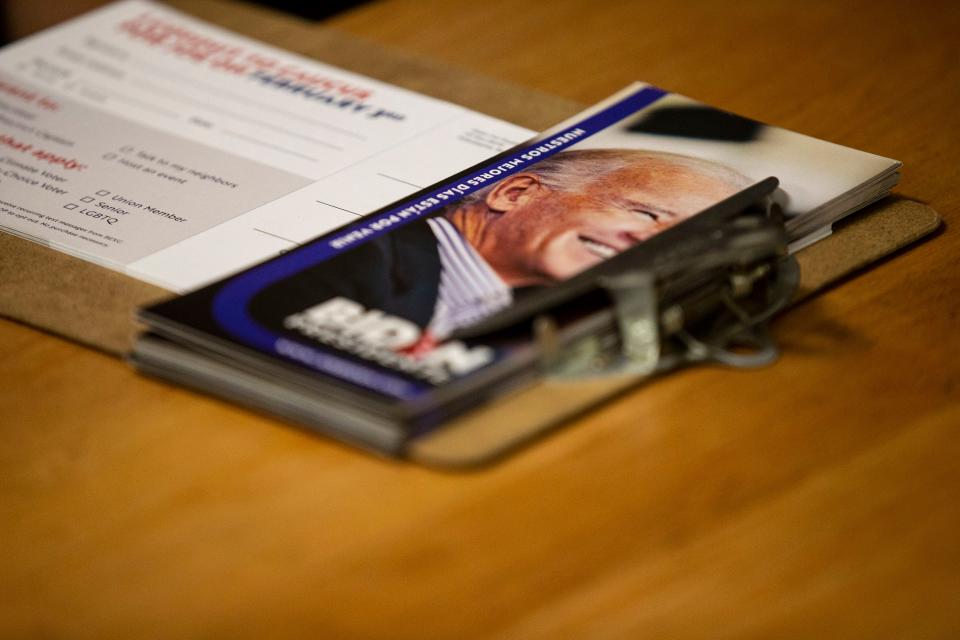
"The Sanders campaign would not have gotten as close as it did last time around if it were not for the Latino vote," Henry said. He's endorsed Castro, the former U.S. secretary of Housing and Urban Development under President Barack Obama.
Obama's historic caucus win in 2008 was also aided by Latino caucusgoers, Henry said. If campaigns want to gain active support from Latinos in Iowa, they need to devote time and money to knocking on doors, sending fliers and calling households in Latino neighborhoods — all things at which Obama's campaign excelled, Henry said.
Immigration is motivating — but it's not the only issue
Castro is the only Latino candidate in the Democratic presidential race. He's an accomplished politician — he was also the mayor of San Antonio — but he said he's often asked by national media to weigh in on immigration and Trump's anti-immigrant rhetoric.
"I usually get the first question on immigration," Castro said at a town hall in Des Moines of his role in the televised Democratic primary debates. In the October debate: "We spent three hours and we didn't talk about climate change. We didn't talk about housing."
Some Latino caucusgoers said they also feel, and sometimes resent, the focus on immigration.
When Haller met with Linda Yvonne Torres, a 22-year-old first-time caucusgoer in Storm Lake, she told him immigration is one of her top priorities, but not the only one. The others are global warming, college tuition and the economy.
"When people make the immigration issue just about Latinos, I think that’s a step in the wrong direction," Haller said.
Organizers say it's important to acknowledge the breadth of issues that Latinos want to talk about. Medina, with Warren's campaign, often brings a whiteboard along to events and poses a variation of the same question: “What issues matter to you?" She includes the question in Spanish.
One by one the responses come in: Climate change. Reproductive rights. Affordable health care. Wages. Education.
"They're not single-issue voters," Medina said. "They care about a lot of different things."
Still, the future of immigration policy looms large for many Latinos.
Mary Campos, 89 and a well-known activist in the community, attended one of Castro's town halls in Des Moines in October.
She asked him about his plans to help recipients of Deferred Action for Childhood Arrivals, an Obama-era program that provided temporary legal protection to immigrants brought to the United States as children. The Trump administration rescinded the program, though the move was tied up in court challenges. The U.S. Supreme Court is expected to decide its future in its current term.
"I'm worried about my godchildren," Campos told Castro, whose presidential bid she supports. "What am I going to do with them? What’s going to happen to us?"
Castro reassured her that he would do "everything he can" to help DACA recipients.
"It's true there's tremendous anxiety in a lot of Latino households right now because of how bad the Trump administration has been on the issue of immigration," Castro told the Des Moines Register.
While Castro has endorsements from Latino activists like Campos and Henry, he has struggled to gain broad support. In a September Register/CNN/Mediacom Iowa Poll, just 1% of likely Democratic caucusgoers named him as their first choice.
Barriers to reaching first-time, immigrant caucusgoers
Reaching out to Latino Iowans and making sure they are informed about the 2020 general election is only half the battle. The other is getting them to caucus in February, said Henry, with LULAC.
"Iowa caucuses has always been an inside game, usually reserved for those who are white, who are higher income, those who have been part of the process before," Henry said.
It takes patience and steady outreach to explain the caucus process to first-time caucusgoers, he said.
That's also true for immigrants who don't speak fluent English, Haller, the Biden organizer, has found. While the Iowa Democratic Party will provide written or verbal translation services for Iowans who request language accommodations on caucus night, the process of caucusing is "not the easiest system to understand," he said.
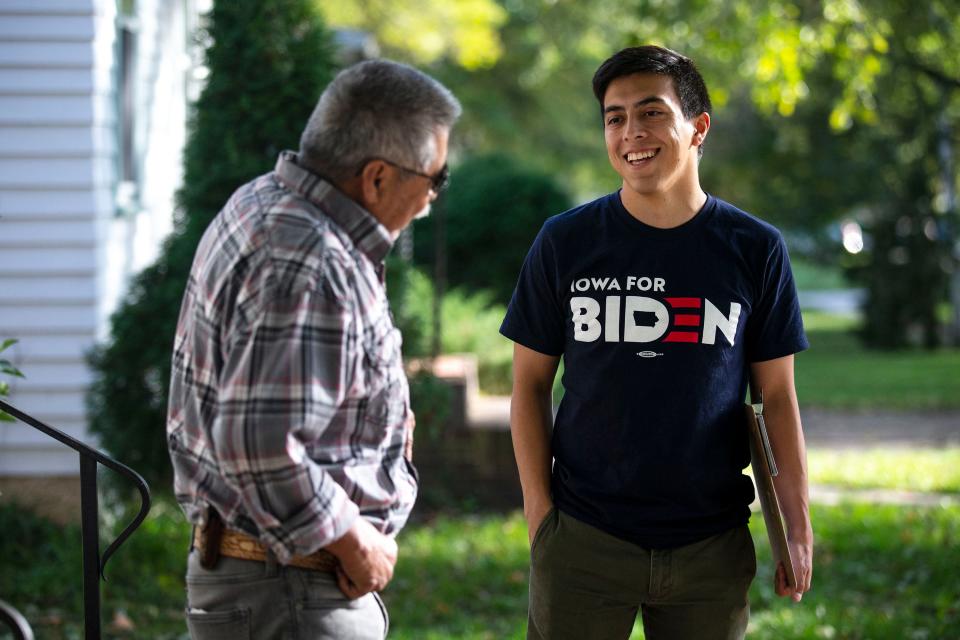
"There are not enough bilingual organizers or bilingual politicians or bilingual community leaders that can explain simply what a caucus is," he said. "That is honestly probably the biggest barrier I see to people practically being able to caucus."
Haller encountered another problem when he knocked on Ramon Medina-Rios' door on a recent October afternoon: Medina-Rios' voting-age sons weren't home.
The two men work at the Tyson meatpacking plant in Storm Lake, Haller said. It meant Haller had to change his door-knocking strategy to try to arrive either late in the evening, during a lunch break, or early in the morning, before they leave for work.
Haller has spoken to the men on previous visits to the home, and Medina-Rios assured him that he and his family still support Biden. Still, Haller left them some pamphlets just in case. Although he said he gets paranoid that first-time caucusgoers won't show up, every indication is that they'll come out to caucus.
"Yeah, 2016 really did light a fire under people to do things that they never did, like caucusing," he said.
Robin Opsahl, Stephen Gruber-Miller and Barbara Rodriguez cover politics for the Register. You can reach Robin at ropsahl@registermedia.com or 515-284-8051. Support reporters who follow your government by becoming a subscriber. Sign up at DesMoinesRegister.com/Deal.
This article originally appeared on Des Moines Register: Election 2020: Latino voters in Iowa playing a bigger role in Iowa caucuses

